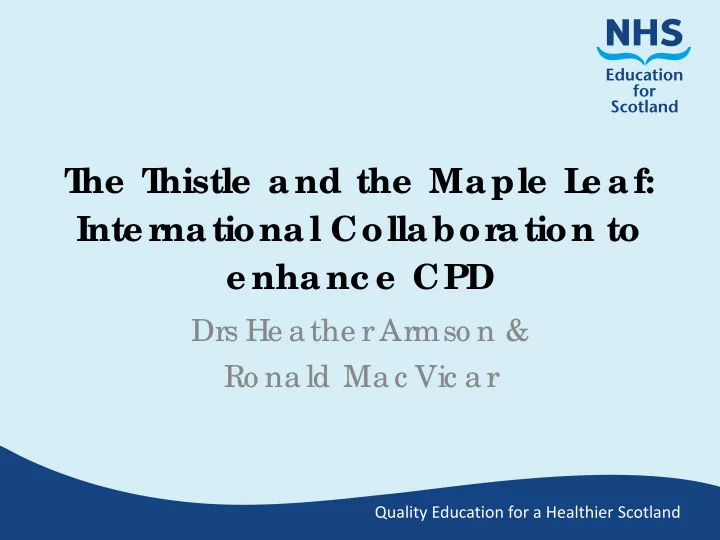

T he T histle a nd the Ma ple L e a f: Inte rna tiona l Colla bora tion to e nha nc e CPD Drs He a the r Armso n & Ro na ld Ma c Vic a r Quality Education for a Healthier Scotland
Quality Education for a Healthier Scotland
Ke y e le me nts of PBSGL • The process - facilitated small group discussion • Trained peer facilitators • The content - evidence based educational modules • The development and sustenance of a community of practice Quality Education for a Healthier Scotland
Ke y e le me nts of PBSGL • The process - a facilitated small group discussion focused on: – Practice reflection – Identification of gaps between current practice and best practice – Strategies to enhance change in practice – Commitment to practice change Quality Education for a Healthier Scotland
Ke y e le me nts of PBSGL • Trained peer facilitators who: – are chosen by their group – are trained in a one-day workshop conducted by experienced facilitator trainers – play a vital role in the enduring success of PBSGL Quality Education for a Healthier Scotland
Ke y e le me nts of PBSGL • The content - evidence based educational modules that: – present specific representative patient cases that stimulate participants in the small groups to reflect on similar cases from their own practices – summarise relevant best available evidence relevant to primary care practice – promote application of scientific knowledge to the specific patient problems members encounter in their practices, resulting in improved patient care. Quality Education for a Healthier Scotland
Ke y e le me nts of PBSGL • The development and sustenance of a community of practice that – is consistent with educational theory and – is borne out by the function and longevity of groups Quality Education for a Healthier Scotland
PBSGL in Canada • 1992 - Pilot project in Ontario, Canada involving 117 physicians in 16 groups • 1994 - Program extended across Canada (English & French) • 1997- Incorporated in Canada as • The Foundation for Medical Practice Education • 2009 – 6150 family physicians organized in 720 groups - PBSGs in all 10 provinces & 3 national territories - outside of Canada (Scotland, USA, Hong Kong, Saudi Arabia, Kenya, Trinidad & Tobago…) - 2719 PBSG residents - PBSG-NP 557 (plus 180 NP students); PBIL 388 Quality Education for a Healthier Scotland
Quality Education for a Healthier Scotland
PBSGL in Sc otland • 2003/04 pilot of 5 groups (>40 members) & roll-out from 2006 • Memorandum of Agreement with the FMPE • Implemented in GP Specialty Training 2009 • From Canadian modules through ‘tartanisation’ to UK ‘de- novo’ modules • By March 2014 approx 2100 members in over 200 groups (approximately a third of Scotland’s GPs) • Working with other professions to use PBSGL in their context; pharmacists, practice nurses • Uni-professional and inter-professional groups • Module production to meet members’ needs & wants as well as Government priorities Quality Education for a Healthier Scotland
PBSGL Sc otland gr owth 2500 2000 1500 Series1 1000 500 0 2006 2007 2008 2009 2010 2011 2012 2013 2014 Quality Education for a Healthier Scotland
PBSGL Sc otla nd me mbe rship • End March 2014 – 2122 members – 1853 GPs (87%) – 91 Nurses (4%) – 140 pharmacists (7%) – 38 ‘other’/ unknown (2%) – ...plus up to 1000 GP Specialty Trainees • More than 2/3 of the membership is female • Planned detailed survey of membership Quality Education for a Healthier Scotland
PBSGL r e se ar c h • Canada – (Premi, Academic Med 1994) – BPP (Herbert, Family Practice 2004) & CTC (JCEHP 2003) – Categorization of commitment-to-change statements – Role of practice tools in knowledge implementation – Impact of test enhanced learning, CTC & community • Scotland – PBSGL in pharmacy – Inter-professional learning – PBSGL for Faculty Development – PBSGL in GPST Quality Education for a Healthier Scotland
PBSGL oppor tunitie s • Collaboration : modules, research, programme changes • Potential to increase the pool of module authors • Further development of inter-professional approaches to practice based learning (integration agenda in Scotland) • Opportunities to incorporate successful components that are developed by the other programme e.g. Practice Reflection Tool, Newsletter, Facilitator training module • Broadening the pool of people who are thinking, talking and researching various components of the programmes • Further development of the PBSGL network (Wessex) Quality Education for a Healthier Scotland
PBSGL c halle nge s Effective collaboration • Cultural differences in practice & language impact module development • Ownership of the program and its transformation • Clarity around negotiable and non-negotiable aspects of the programme • Expansion vs dilution • Consistency of peer-facilitator training • Organisational size & structure- maintenance & expansion • Canadian programme has been developed by a small group of physicians (directors of programs, facilitator training, module authors & editors) that is spread across the country and supported by a central office at McMaster University in Hamilton Scotland has a small, close knit team functioning in a much smaller, geographical area but that is stretched to the limit Funding for research & development • Quality Education for a Healthier Scotland
T he Canada T histle Quality Education for a Healthier Scotland
Recommend
More recommend